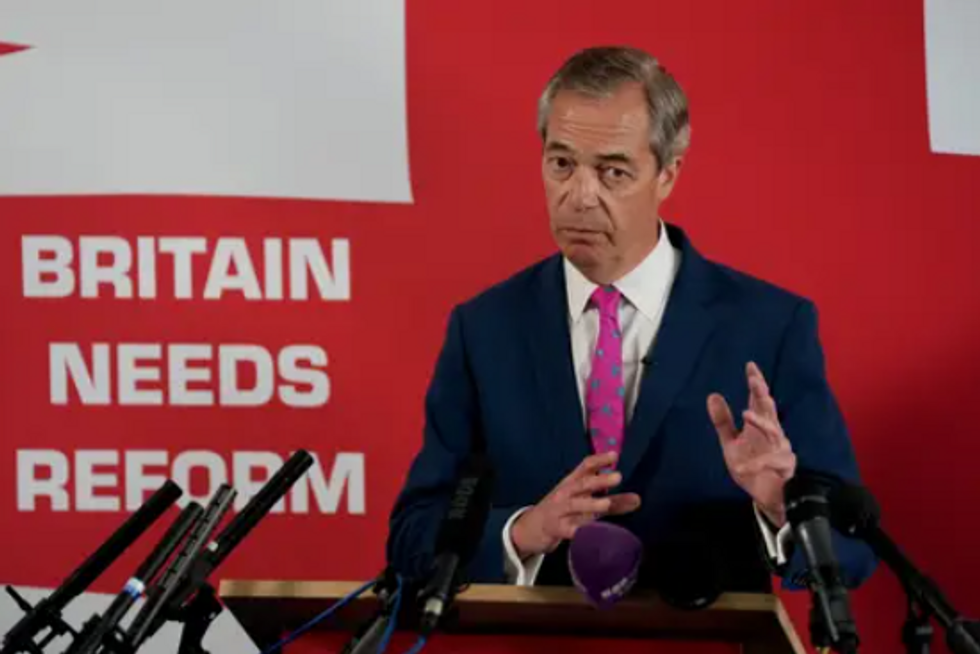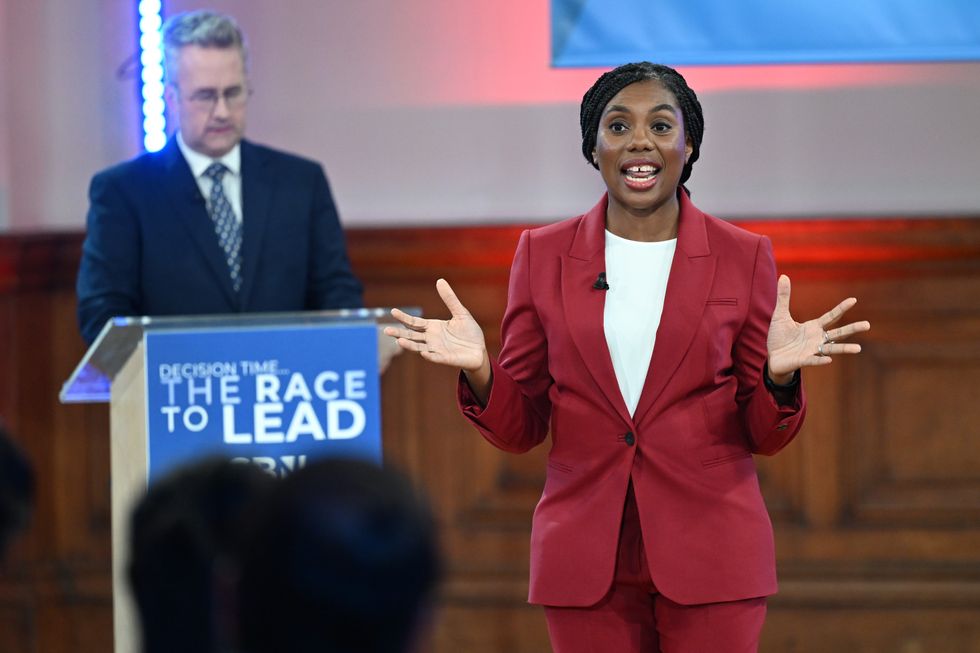Jack Walters
Guest Reporter
A split on the right will likely keep Sir Keir Starmer’s Labour Party in power, research conducted by GB News has revealed.
Local by-elections held since the 2024 General Election show Labour often benefit from Reform UK’s inclusion, with the populist party making just five gains since July 4.
Despite suffering net losses, Labour has won 53 seats and snatched five wards from the Tories and Independents.
Conservative candidates almost doubled the Tories overall haul, claiming victory in 44 contests.

The Liberal Democrats have seen no net change, winning 26 races
Aggregate vote shares put the Tories and Labour neck-and-neck on 24 per cent, with the Liberal Democrats on 18 per cent and Greens on 10 per cent.
Despite receiving just 6.7 per cent of the vote, Reform UK often outperforms its average support given it does not always stand candidates.
Reform UK has fielded candidates in just two-in-five council by-elections, increasing its 5.9 per cent national vote share improvement to 13 per cent in such contests.
Tories perform 6.4 per cent worse when up against Reform UK, enabling Labour to claim narrow victories recently in Bispham and the Nedge.
In fact, Conservative support slumps by -2.8 per cent if Reform UK fields a candidate, with Tory votes ticking up by 3.6 per cent otherwise.
Labour’s drop in support is also marginally less pronounced if Reform UK stands, down 7.4 per cent compared to 9.2 per cent in more conventional run-off.
Liberal Democrats increase support modestly when up against the populist party, with a 1.1 per cent difference being registered thus far.
Such fine margins also make it difficult to see a situation where a resurgent Reform UK can enter power without Nigel Farage destroying Kemi Badenoch’s Tories or the Conservative Party absorbing a large chunk of the populist party's support.

A recent More in Common opinion poll put Conservative support at 28 per cent, three points higher than those currently backing Labour.
However, with Reform UK on 19 per cent, the Liberal Democrats on 13 per cent and the Green Party on eight per cent, Electoral Calculus expects Labour would still win 252 seats.
Despite hypothetically making 121 net gains, the Tories languish narrowly behind on 242 seats.
The Liberal Democrats would suffer 15 net losses, taking Sir Ed Davey’s centrist clan down to 57.
Reform UK would make a large number of gains, with a 35 seat boost returning 40 MPs to the House of Commons.
However, with the Greens ending up on 5, SNP returning 21 MPs, Plaid Cymru clinging on to two MPs and Independents surging to 13, a "rainbow coalition" would likely push Starmer over the finish line, undoubtedly with the SNP demanding yet another divisive independence referendum.
A Tory-Reform-DUP alliance, which remains rather unlikely, would leave the right significantly short of 326 seats on just 287.
Most of Reform UK’s gains - 30 - would come at the expense of Labour, with just nine Conservatives facing the chop and one Liberal Democrat in Devon.
Looking at key targets for both the Tories and Reform UK, it is abundantly clear that the split on the right still benefits Labour.

The bellwether seat of Harlow would likely see Labour’s 5.8 per cent majority over the Tories collapse to just 0.3 per cent, with Reform UK hoovering up 24 per cent.
Stevenage would witness a similar outcome as Labour’s lead slumps from 15.5 per cent to 10 per cent, with the populist party holding 20.2 per cent support.
A similar situation is emulated in many of the 89 seats where Reform UK finished runner-up on July 4.
Blackpool South would likely show Labour’s 19.5 per cent lead over Reform UK collapse to just 2.8 per cent, with Tory support stabilising at 26 per cent.
But this is really a best-case scenario for everyone but Starmer because most opinion polls still put Labour ahead of the Tories.
The 2015 General Election now appears as something of an outlier given David Cameron won a shock majority despite Ukip receiving 12.6 per cent of the vote.
However, the main difference comes as a result of where Farage’s supporters ended up in 2019.

Around two-in-five 2015 Ukip voters previously supported Tory, with 17 per cent siding with Labour and 22 per cent preferring the Liberal Democrats.
By 2024, around 80 per cent of Farage’s 14.4 per cent base support voted for Boris Johnson to ‘Get Brexit Done’.
This is not to say it is an easy fix for the Tories, given just one-in-three Reformers would currently vote Conservative if the populist party failed to field a candidate.
However, with Reform UK pledging to field significantly more candidates in the 2025 Local Elections compared to contests held last year, May 1 will prove a major test for the populist party.
And the Tories face an uphill battle to come out of the next local elections claiming victory, with Badenoch defending 1,448 seats to just 365 for Labour.
Reform UK will likely make major gains from a standing start but will hope to exceed the 148 seats won by Ukip in its pomp.
So, despite dire opinion polls for Labour and Starmer’s honeymoon being over in the blink of an eye, the split on the right remains a major problem for both Badenoch and Farage in 2025 and beyond.
Find Out More...
Local by-elections held since the 2024 General Election show Labour often benefit from Reform UK’s inclusion, with the populist party making just five gains since July 4.
Despite suffering net losses, Labour has won 53 seats and snatched five wards from the Tories and Independents.
Conservative candidates almost doubled the Tories overall haul, claiming victory in 44 contests.

The Liberal Democrats have seen no net change, winning 26 races
Aggregate vote shares put the Tories and Labour neck-and-neck on 24 per cent, with the Liberal Democrats on 18 per cent and Greens on 10 per cent.
Despite receiving just 6.7 per cent of the vote, Reform UK often outperforms its average support given it does not always stand candidates.
Reform UK has fielded candidates in just two-in-five council by-elections, increasing its 5.9 per cent national vote share improvement to 13 per cent in such contests.
Tories perform 6.4 per cent worse when up against Reform UK, enabling Labour to claim narrow victories recently in Bispham and the Nedge.
In fact, Conservative support slumps by -2.8 per cent if Reform UK fields a candidate, with Tory votes ticking up by 3.6 per cent otherwise.
Labour’s drop in support is also marginally less pronounced if Reform UK stands, down 7.4 per cent compared to 9.2 per cent in more conventional run-off.
Liberal Democrats increase support modestly when up against the populist party, with a 1.1 per cent difference being registered thus far.
Such fine margins also make it difficult to see a situation where a resurgent Reform UK can enter power without Nigel Farage destroying Kemi Badenoch’s Tories or the Conservative Party absorbing a large chunk of the populist party's support.

A recent More in Common opinion poll put Conservative support at 28 per cent, three points higher than those currently backing Labour.
However, with Reform UK on 19 per cent, the Liberal Democrats on 13 per cent and the Green Party on eight per cent, Electoral Calculus expects Labour would still win 252 seats.
Despite hypothetically making 121 net gains, the Tories languish narrowly behind on 242 seats.
The Liberal Democrats would suffer 15 net losses, taking Sir Ed Davey’s centrist clan down to 57.
Reform UK would make a large number of gains, with a 35 seat boost returning 40 MPs to the House of Commons.
However, with the Greens ending up on 5, SNP returning 21 MPs, Plaid Cymru clinging on to two MPs and Independents surging to 13, a "rainbow coalition" would likely push Starmer over the finish line, undoubtedly with the SNP demanding yet another divisive independence referendum.
A Tory-Reform-DUP alliance, which remains rather unlikely, would leave the right significantly short of 326 seats on just 287.
Most of Reform UK’s gains - 30 - would come at the expense of Labour, with just nine Conservatives facing the chop and one Liberal Democrat in Devon.
Looking at key targets for both the Tories and Reform UK, it is abundantly clear that the split on the right still benefits Labour.

The bellwether seat of Harlow would likely see Labour’s 5.8 per cent majority over the Tories collapse to just 0.3 per cent, with Reform UK hoovering up 24 per cent.
Stevenage would witness a similar outcome as Labour’s lead slumps from 15.5 per cent to 10 per cent, with the populist party holding 20.2 per cent support.
A similar situation is emulated in many of the 89 seats where Reform UK finished runner-up on July 4.
Blackpool South would likely show Labour’s 19.5 per cent lead over Reform UK collapse to just 2.8 per cent, with Tory support stabilising at 26 per cent.
But this is really a best-case scenario for everyone but Starmer because most opinion polls still put Labour ahead of the Tories.
The 2015 General Election now appears as something of an outlier given David Cameron won a shock majority despite Ukip receiving 12.6 per cent of the vote.
However, the main difference comes as a result of where Farage’s supporters ended up in 2019.

Around two-in-five 2015 Ukip voters previously supported Tory, with 17 per cent siding with Labour and 22 per cent preferring the Liberal Democrats.
By 2024, around 80 per cent of Farage’s 14.4 per cent base support voted for Boris Johnson to ‘Get Brexit Done’.
This is not to say it is an easy fix for the Tories, given just one-in-three Reformers would currently vote Conservative if the populist party failed to field a candidate.
However, with Reform UK pledging to field significantly more candidates in the 2025 Local Elections compared to contests held last year, May 1 will prove a major test for the populist party.
And the Tories face an uphill battle to come out of the next local elections claiming victory, with Badenoch defending 1,448 seats to just 365 for Labour.
Reform UK will likely make major gains from a standing start but will hope to exceed the 148 seats won by Ukip in its pomp.
So, despite dire opinion polls for Labour and Starmer’s honeymoon being over in the blink of an eye, the split on the right remains a major problem for both Badenoch and Farage in 2025 and beyond.
Find Out More...